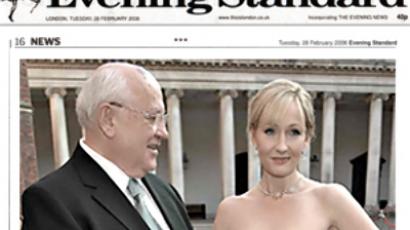‘Journalists must save ailing UK newspaper’ – billionaire
One of Russia's richest men has paid just one pound for a 75.1 per cent stake in London's Evening Standard newspaper. Former KGB agent Aleksandr Lebedev says it’s now up to journalists to save the famous English daily.
After more than six months of negotiations, billionaire businessman Lebedev is the first Russian to own a leading UK newspaper.
The remaining 24.9 per cent of the newspaper will be retained by the Daily Mail & General Trust PLC. Lebedev says there are no plans to move the paper’s headquarters.
The newspaper has been losing money for months and Lebedev sees this as an opportunity to help it grow again.
He said: “Buying the evening standard was a social mission, I would like to see it start making profit in a few year’s time.”
Lebedev said a lot “depends on the journalists, not me.”
“My task is to provide them with the minimal means so they can work in peace – like I did with Novaya Gazeta,” Lebedev said.
Lebedev, who owns a partial stake in the Novaya Gazeta, one of the few Russian media outlets critical of the Kremlin, said the deal was about saving the title from closure.
“The deal, strictly speaking, is not a purchase. This is what businessmen call ‘cash-in,' which means that money should come to the newspaper under a certain schedule in order to guarantee its survival,” said Lebedev.
Director of the international journalism forum, Polis, Charlie Beckett, sees the venture as a lost cause.
“We are going to enjoy watching him try – it’s certainly going to be a lot more colourful and a lot more enjoyable for a short term. But all the trends in the newspaper business certainly in London are downwards and we are facing a massive economic crisis so I think it’s a doomed enterprise,” Beckett said.
Regardless of the economic situation Mr Lebedev wants to give it a try.
“I see real synergy between Novaya Gazeta and the Evening Standard; I think our cities and our countries are actually much closer than it's usually thought,” Lebedev said.
Lebedev insists he won’t interfere with the paper’s editorial policy.
“I would like the newspaper to be objective and unbiased, so that one could read it with interest. Even if I wanted to change the information policy, what is the use of me? I am not a journalist. This all is on the shoulders of journalists,” he said.
It is understood that Andrew Mullins, the Evening Standard managing director and former general manager of Times Media, will become chief executive.
Simon Davies, the former Mail on Sunday ad director who was moved to the same role at the Evening Standard, will fill the post of managing director.
Who is Mr. Lebedev?
The son of Moscow intelligentsia parents, Lebedev studied for a PhD in economics before joining the KGB's elite foreign intelligence directorate.
After the collapse of the Soviet Union, Lebedev returned from London and went into business.
His fortune is based on the ownership of one of Russia’s leading private banks. His portfolio now includes a 30% share in Aeroflot, Russia's state airline, as well as a stake in Gazprom and other concerns.
But Lebedev’s interests go well beyond money.
In 2006 he teamed up with ex-Soviet leader Mikhail Gorbachev to invest in the Russian liberal newspaper Novaya Gazeta, whose investigative journalist Anna Politkovskaya was shot dead two years ago. Lebedev offered one million dollars for information leading to the arrest of her killer.
Last year, Lebedev shut down another of his newspapers, the Moscow Korrespondent, after it published a story about Vladimir Putin's alleged affair with an Olympic gymnast.
Lebedev describes himself as a capitalist-idealist. He has also used his large fortune to improve the life of ordinary people – for example, by building a 12-storey cancer hospital in St Petersburg where children can be treated for free.
In Britain, he and his London-based son Evgeny run the Raisa Gorbachev Foundation, which has already raised millions of pounds for Russian children with cancer.
In Britain, it’s seen as a good sign that he’s proven to be happy with independent journalism. It’s hoped he will continue this tradition in the UK. One question remains: will he be able to save an ailing newspaper?













